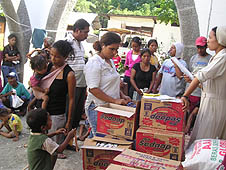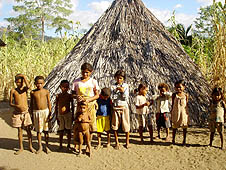DILI (UCAN) -- James Whitehead, international programs director of Progressio, an international charity with Catholic roots, looks at the crowded international aid scene in a country that is struggling to find its feet
 |
A nun distributes food donated by Caritas to refugees in Timor Leste. The country has about 100,000 refugees and internally displaced people. (File photo) |
Ten years since the people of this troubled island nation voted for independence from Indonesia, Timor Leste remains one of the poorest nations in Southeast Asia.
Life expectancy is low –- just 67 years –- and at least half of the nation’s million or so people -- 98 percent Catholic -- are unemployed. It’s little wonder that 40 percent are forced to survive on less than a dollar a day.
The statistics tell a dismal story:
• Estimated youth unemployment: 80 percent
• International aid spent on Timor Leste since 1999: US$10 billion
• Number of refugees and internally displaced people: 100,000
• Infant mortality rate: 42 per 1,000 live births
So it seems logical that international aid is big business in Timor Leste and explains the highly visible foreign presence here.
The government reiterates its thanks to the international community in tedious formal events, opening ceremonies and the like that are broadcast to the masses on television.
But isn’t any highly visible foreign presence likely to feel like an occupation? And when does the helping hand of the UN and others become the stifling hand of paternalism? When do good intentions to “help” end up undermining people’s sense of control and sovereignty?
As I mull this over, a number of things strike me. It worries me that so little money trickles down to rural areas. I am stunned by how many projects re-create a dependency that they seek to reduce, by the fact that many of the brightest minds are snapped up by well-paying international organizations, leaving the government, local NGOs and community-based organizations with what’s left.
Of course, one can’t say that donor funds -– especially in such vast quantities –- don’t make any difference. Just this July, Mario Carrascalao, Timor Leste's deputy prime minister, insisted that progress is being made, saying the international community has helped create peace.
I saw some of this progress myself. In one rural village I visited, people are now able to draw water from a nearby hand pump instead of having to collect it from a distant contaminated stream.
But is that enough?
In all this mayhem, many of us who work in international development console ourselves by saying that we are working in partnership with “local organizations,” hoping that this gives us a sense of legitimacy and helps to assuage our concerns that we are acting with unilateral paternalism.
But, I ask, are these local partners fully independent -– is it they who are driving the development agenda of their country and providing services that they think are important for the people they work with? Or are they marionettes jerking in time to an international tune?
The answer, sadly, is that they are frequently the latter. If an international NGO has the money and a “great idea,” then they can usually find a local organization that will join in as a sub-contractor.
 |
Children standing in front of a hut made of coconut and palm leaves in Timor Leste where 40 percent of the people survive on less than a dollar a day. (File photo) |
There are many aspects to aid effectiveness -- and a whole host of reasons why some aids work and others don’t. There can be no doubt that Timor Leste is a special case, with a whole raft of issues which will need to be addressed if the country is to move forward.
The desire of many Timorese to secure justice for the thousands of men, women and children who lost their lives during decades of tyranny is a vital step toward helping set Timor on the path to recovery.
We don’t have all the answers -- nor can we hope to tackle such vital issues as widespread lack of infrastructure or access to employment. These are huge challenges which will require long-term investment.
But local ownership of development is a concept which must be taken seriously. How else will people have the power to solve their own problems? Through a skill-share approach -– and in close consultation with local people –- I hope that we can play a small part, albeit a backstage one, in the long-term development of this infant nation.
This is an edited version of an article that first appeared in “Justice” magazine, a Catholic publication covering issues such as the environment, migration, the economy, poverty and conflict.
source: ucanews.com

No comments:
Post a Comment